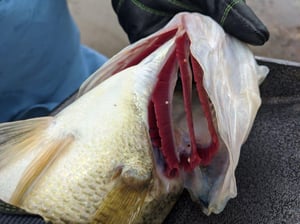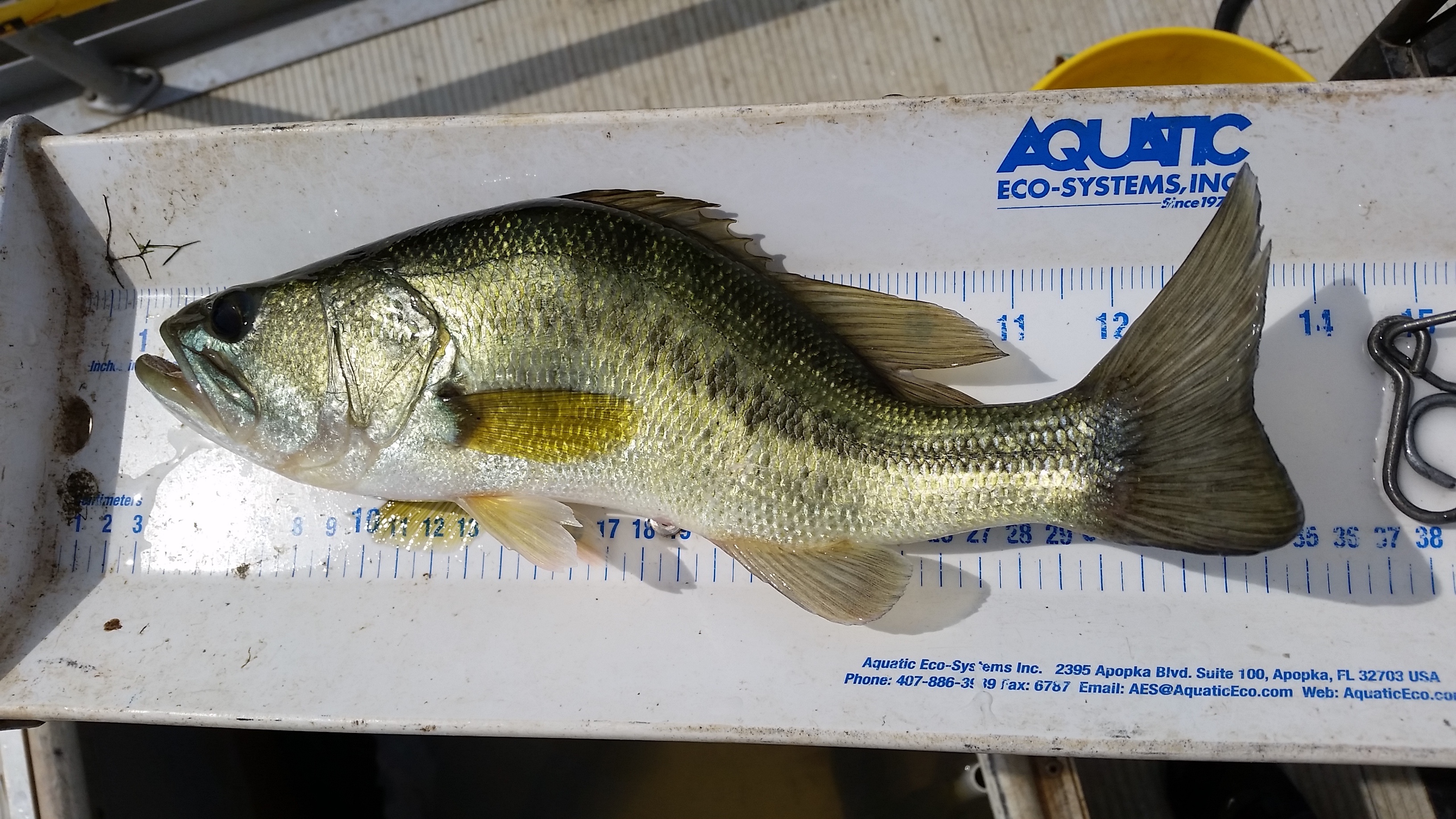Although stocking fish legally harvested from another body of water may seem like a free way to stock your pond, it can actually have some pretty costly consequences.
"Free" Fish for Pond Stocking
In Texas, it is legal to stock "legally Harvested" fish (or "free" fish) from a public body of water into your private lake or pond. All that is required for a fish to be considered legally harvested is that the angler holds a valid Texas fishing license, follows specific length limits, and abides by all lake-specific and/or state regulations.
Additionally, it is legal to transfer fish from one private water body to another. Although these stocking or supplemental stocking methods for your pond are legal, there are special considerations you should weigh before doing so.
The Costs Associated with "Free" Fish
First, you must consider the risks of introducing parasites/diseases or poor-quality genetics to your pond when transplanting fish from another body of water. You must also consider the effect the removal of these fish will have on the body of water they are harvested from.
This becomes especially important when taking fish from another private body of water. We will look at these risks and considerations and go over how to reduce the chances of adverse effects.
Introduction of Parasites and Disease

Introducing a foreign body such as a parasite is the most significant risk you take when transferring fish from a public body of water to your pond. When in the large scale of a lake or reservoir, a parasite on a few fish often is not significant, but when placed into a smaller scale setting such as your pond, it can have a much more significant effect.
Smaller water bodies decrease the amount of time it takes for the parasite to spread due to available hosts being at a much greater density.
Parasites such as Ichthyophthirius multifiliis, also known as "Ich" or "white spot disease," can be very harmful to your fish. This parasite causes damage to the attachment site on the fish, causes fish to rub against structure, removing slime coat, and can damage gills, reducing the fish's oxygen uptake. Ich is known to spread quickly in pond settings and be very difficult to treat as only certain life stages are vulnerable to chemical treatments. Ich is one of the few parasites known to cause direct mortality due to damage to attachment sites such as around the gills.
Most parasites, such as flukes and grubs, simply just lower the fitness of the individual. However, by reducing the individual's fitness, they become more susceptible to diseases and fungal infections, ultimately leading to increased mortality rates.
Evaluate Your Fish’s Visible Health to Prevent Contaminating Your Private Pond
One preventative measure you can take to decrease your chances of introducing one of these parasites into your pond ecosystem is by thoroughly examining each fish you plan to introduce.
Check for any flukes, worms, grubs, or white spots adhering to the body, eyes, gills, and fins. Also, check for any fin rot, off-colored pale skin, sores, or ulcers.
If your fish have any of these characteristics, do not stock them in your pond.
Pre Treat Fish Prior to Release if Possible
If available, use a large tank with an aerator and recirculator to isolate whatever fish you plan to stock for a few days with the proper treatment of formalin to ensure all your fish are clean of parasites and diseases before entering your pond.
Introduction of Bad Genetics
Much like parasites, poor genetics can be introduced into your pond. Fish with bad genetics often have lower reproductive potential, diminished growth rates, and increased mortality rates.
All of which can be passed on to their offspring, which lowers survivorship and recruitment the next year. It can be challenging to assess if a fish is predisposed to having bad genetics, so it is best to harvest fish that exceed the state minimum length limit (in private bodies of water).
By selecting fish of this larger size class, you decrease the odds that your fish is genetically disposed to becoming stunted as most fish become stunted at smaller size classes.
Also, within this larger size class, do not select fish with an abnormally large head or small body. This can be a sign that that fish suffers from some growth deficiencies. Instead, choose fish with a fuller body and wide back whenever possible. By doing this, you are selecting fish with a greater relative weight and increased fitness.
To be more accurate, you can calculate the fish's relative weight using our Pond King App. Within this app, you can enter your bass's length and weight and automatically calculate relative weight (%). A percentage of 85% or greater is considered a healthy fish and good fish to stock. If a percentage of less than 85% is shown, it is suggested to not stock your pond with that bass.
Visible Signs of Poor Genetics
In the photos below, the fish to the left is far more proportional, with a good-sized head, and round belly and back. In the photo to the right, the fish's head is out of proportion with the body, and it has more of a triangular shape (vs. oval), indicating that it is underweight.
| Do Stock | Don't Stock |
 |
 |
Opportunity Cost Associated with Fish Removal
Cost often refers to money, but in this context, we refer to the opportunity cost of removing fish from another body of water. The opportunity cost is relatively low when taking fish from a large public body of water, but becomes more meaningful when taking fish from another small, private body of water.
Small bodies of water do not support as many fish as larger ones and are more drastically affected by the addition and removal of individuals. Let's think about taking twenty-five 15-inch bass out of a 1-acre pond. A healthy one-acre pond can usually support around 100 pounds of bass. Twenty-five bass at 15-inches (avg. 1.8lbs @ 100% Wr) is about 45 pounds of bass.
This is nearly half of the bass this pond is capable of supporting. Come spawning season, the pond will exhibit only about half as much recruitment as it did in previous years. This continuously lowers fish density and angler success rates.
Lower recruitment means less of a chance that any of that generation will reach the next size class. When fewer and fewer fish can grow to broodstock sizes, you see the decline of the fishery.
This concept is even more critical when harvesting out forage species, such as bluegill, to stock your pond. Bluegill are heavily preyed upon and are often the primary forage of bass in a pond. They heavily rely on large recruitment numbers to ensure some of the fry survive to a broodstock size. When recruitment rates stop exceeding the bass's predation rates on the bluegill, you see the food supply for your bass decline. Declining food supply for predators means reduced fitness, slower growth rates, diminished recruitment as fry become alternative forage, and population density decline.
It is imperative to consider these types of consequences with harvesting large numbers of fish out of small populations. Rather than taking all your fish out of one pond, it would be advised to take smaller numbers out of several different populations within a reasonable area. This reduces the impact of fish removal on each pond, as well as increased genetic diversity in your pond.
Proceed with Caution When Relocating Fish for Pond Stocking
Harvesting fish from outside sources can be a good way to add larger fish and new genetics to your pond. However, you must take precautions to ensure you are not causing more harm than good.
Contact Pond King for Fish Stocking Inquiries
If you have any further questions about stocking your own pond or ensuring that the fish you want to stock will not hurt your fishery, please check out this video. If you have any questions or are in need of information on private pond fish management, give our team a call or contact us!
See y'all down at the pond.




